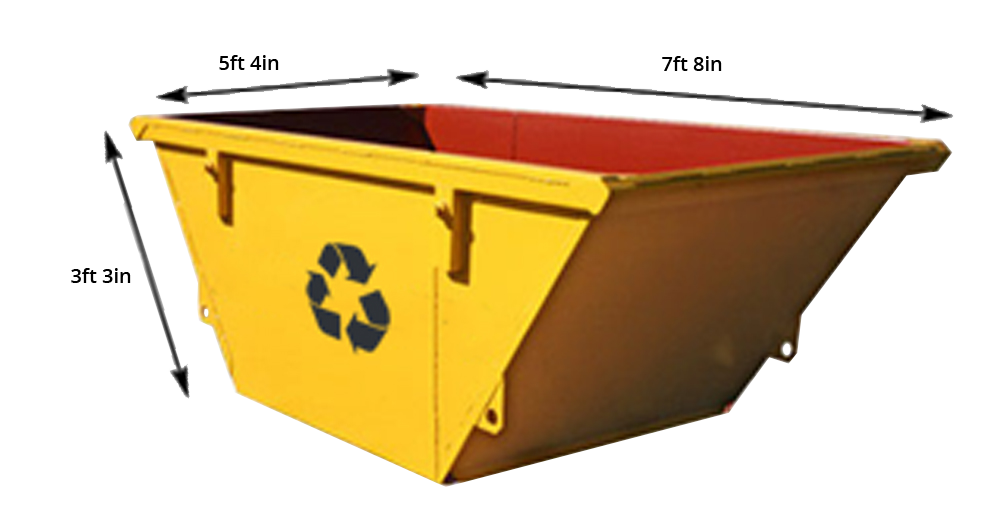In the dynamic landscape of waste management, understanding the nuances of skip sizes is indispensable. Among the myriad options, the 4 yard skip stands out as a versatile solution, embodying the perfect equilibrium between size and functionality. In this comprehensive exploration of 4 Yard Skip, We delve deep into its multifaceted aspects, shedding light on its diverse applications and advantages.
As we navigate through its dimensions, loading capacities, environmental impact, and regulatory considerations, we unravel the intricacies of this essential waste disposal tool. Join us on a journey to decode the significance of skip sizes, particularly the 4 yard variant, and discover how it plays a pivotal role in shaping efficient and sustainable waste management practices.
Unlocking the Potential of the 4 Yard Skip: A Comprehensive Guide
Skip Bin Size: In the realm of waste management, the 4 yard skip bin stands out as a versatile solution. Its moderate size strikes a balance between capacity and convenience, making it ideal for various purposes. Whether you’re renovating your home or managing a small-scale construction project, this size ensures you have ample space to dispose of waste without it becoming an eyesore or hindrance.
Waste Disposal: Efficient waste disposal is paramount in any community. The 4 yard skip facilitates responsible waste management, ensuring that domestic and construction waste is disposed of properly. This not only maintains the cleanliness of the surroundings but also prevents environmental hazards, promoting a healthier living environment for everyone.
Construction Industry: Within the construction industry, time is money. The 4 yard skip plays a crucial role in optimizing construction sites. Its size is perfect for managing construction debris, allowing workers to focus on their tasks without the distraction of clutter. Moreover, it aids in adhering to safety standards, ensuring a hazard-free workspace.

Waste Management: Waste management is a multifaceted task involving collection, transportation, and disposal. The 4 yard skip eases the burden of waste management companies. Its manageable size simplifies collection logistics, making the process more streamlined and cost-effective. This efficiency translates into better services for communities, contributing to overall environmental health.
Environmental Conservation: Environmental conservation is a global concern. By choosing the 4 yard skip, individuals and businesses actively participate in conserving the environment. Proper waste disposal reduces pollution, preserves natural habitats, and supports recycling efforts. Small steps, like opting for an appropriate skip size, collectively lead to significant strides in environmental preservation.
Size and Dimensions: The 4-yard skip, a popular choice in waste management, is renowned for its compact size and practical dimensions. Typically measuring around 6 feet long, 4 feet wide, and 3 feet high, this skip strikes the perfect balance between space efficiency and loading capacity. Its modest footprint makes it suitable for urban areas or properties with limited space, ensuring convenient placement without obstructing pathways or causing inconvenience to neighbors.
Rental Services: Numerous waste management companies offer rental services for 4 yard skips, providing customers with a hassle-free solution for their waste disposal needs. These services often include prompt delivery, flexible rental durations, and efficient pick-up services. Renting a 4-yard skip is a convenient option for homeowners, businesses, and construction sites, allowing them to focus on their tasks while professionals handle the waste disposal process.
Loading Capacity: Despite its relatively small size, the 4 yard skip boasts a surprisingly generous loading capacity. It can hold approximately 30 to 40 bin bags of waste, making it ideal for various projects, including home renovations, garden clearances, and small-scale construction endeavors. Its ample loading capacity ensures that substantial amounts of waste can be efficiently managed without the need for frequent pickups, saving time and effort for both individuals and businesses.
Regulations and Permits: Understanding local regulations and permits is crucial when renting a 4 yard skip. Different areas might have specific guidelines regarding skip placement on public roads or private properties. Some local authorities require permits for skip placement on public land, ensuring safety and proper waste management practices. It is essential for renters to familiarize themselves with these regulations and obtain necessary permits to avoid any legal complications during the rental period.
Recycling Practices: Responsible waste management includes a strong emphasis on recycling practices. Many waste management companies operating 4 yard skips have robust recycling initiatives in place. They sort through the collected waste, segregating recyclables from general waste. This eco-conscious approach minimizes the environmental impact, reduces landfill waste, and promotes the reuse of valuable resources.
Customers renting 4 yard skips can contribute significantly to recycling efforts by disposing of recyclable materials separately, furthering the cause of environmental sustainability and conservation. Understanding these entities associated with the 4 yard skip is essential for making informed decisions, ensuring efficient waste disposal, and actively participating in environmentally friendly practices. By considering size, rental services, loading capacity, regulations, and recycling practices, individuals and businesses can make a positive impact on both their immediate surroundings and the broader environment.
Skip Bin Material: The material used in constructing skip bins plays a pivotal role in their durability and effectiveness. Skip bins are commonly made from sturdy materials like steel or heavy-duty plastic. Steel bins are robust and resistant to damage, making them ideal for handling heavy loads and construction debris. On the other hand, plastic bins are lightweight, rust-free, and suitable for general household waste. The choice of material depends on the type of waste to be disposed of and the specific requirements of the project. By selecting the right skip bin material, users ensure efficient waste containment and transportation while contributing to the longevity of the bins.
Cost and Pricing: The cost and pricing structure of skip bins vary based on several factors, including the size of the bin, the duration of the rental period, the type of waste to be disposed of, and the location of the project. Larger bins generally come at a higher cost due to their increased loading capacity. The duration of the rental period, whether short-term or long-term, also influences the pricing.
Additionally, specialized waste, such as hazardous materials, might incur additional fees. It’s essential for customers to obtain detailed quotes from waste management companies, considering all these factors. Understanding the cost and pricing aspects ensures that users can budget effectively for their waste disposal needs and select a skip bin that aligns with their financial constraints.
Delivery and Pickup Services: Efficient delivery and pickup services are paramount in the skip bin rental process. Reputable waste management companies offer timely delivery of skip bins to the specified location, ensuring that the project can commence without unnecessary delays. Likewise, prompt pickup services are vital to prevent overflowing bins and maintain a clean environment.
Reliable companies schedule pickups at the end of the rental period or upon request, promptly removing the filled skip bins and facilitating proper waste disposal. Additionally, some companies provide same-day or next-day delivery and pickup services, catering to urgent requirements. Choosing a provider with efficient delivery and pickup services not only enhances the convenience of waste disposal but also reflects the professionalism and reliability of the service, ensuring a seamless experience for the customers.
Safety Measures: Ensuring safety during waste disposal is paramount, and it begins with the use of skip bins. Safety measures associated with skip bins include clear labeling indicating the type of waste that can be disposed of, as well as weight limits to prevent overloading, which could lead to accidents during transportation.
Skip bins often have safety lids or covers to prevent debris from spilling out, enhancing safety for both workers and the general public. Proper placement of skip bins away from traffic areas and adhering to weight restrictions are crucial safety precautions. Moreover, users should wear appropriate protective gear, such as gloves and safety goggles, when loading waste into the bins. Emphasizing safety measures not only prevents accidents but also promotes a culture of responsible waste management within communities and workplaces.
Alternative Waste Disposal Methods: While skip bins are a popular and convenient waste disposal solution, exploring alternative methods is essential for comprehensive waste management. Recycling, composting, and reusing materials are eco-friendly alternatives that reduce the amount of waste sent to landfills. Recycling initiatives, where materials like paper, plastic, glass, and metal are sorted and processed for reuse, significantly contribute to environmental conservation.
Composting organic waste, such as food scraps and yard trimmings, enriches soil and reduces the need for chemical fertilizers. Additionally, reusing items, when possible, reduces the demand for new products, conserving resources. Public awareness campaigns and accessible recycling centers play a crucial role in encouraging these alternative waste disposal methods, fostering a more sustainable approach to waste management.
Local Waste Disposal Regulations: Understanding and adhering to local waste disposal regulations is vital for individuals, businesses, and waste management companies alike. Local regulations often dictate the types of waste that can be disposed of, recycling requirements, and permissible disposal methods. Some areas have strict guidelines for hazardous waste disposal, necessitating specialized handling and disposal procedures.
Permits may be required for placing skip bins on public property, and violating these regulations can result in fines and legal consequences. Keeping abreast of local waste disposal regulations ensures legal compliance, promotes environmental responsibility, and prevents negative impacts on the community. It also encourages the development of efficient waste management systems, reflecting the collective commitment to maintaining clean and safe environments for everyone.
